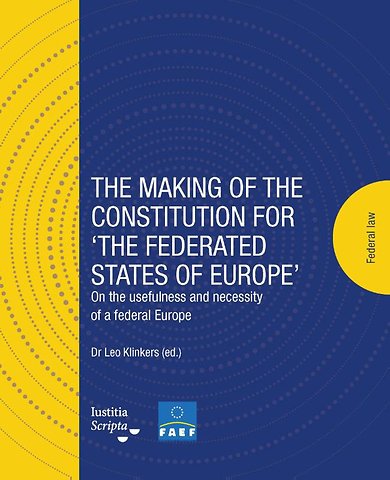



Leo Klinkers is directeur van Klinkers Public Policy Consultants.
Meer over Leo KlinkersThe making of the Constitution for ‘The Federated States of Europe’
On the usefulness and necessity of a federal Europe
Paperback Engels 2022 1e druk 9789083247526Samenvatting
This book was written by members of the Citizens' Convention of the Federal Alliance of European Federalists (FAEF, www.faef.eu). It contains a constitution of only ten articles for a federal Europe, an extensive explanation of those articles and a number of studies that explore aspects of federalism in greater depth.
It is a response to the identity crisis in which the European Union finds itself. A crisis that leads to the disintegration of the EU, with the risk of falling back to the situation of warring nation states of the 19th and 20th centuries. A relapse that can and must be prevented by piloting the European system of states safely into its next phase: that of a federal Europe.
Brexit, conflicts of principle between EU member states and the quarrels between member states and 'Brussels', give little hope for preservation of unity within the EU system. What was built up after WWII is in danger of being lost; even the absence of war on the eastern side of the EU can no longer be taken for granted. The EU is governed in a way where nobody knows who the boss is. Lack of democratic support affects the peace, security, prosperity and happiness of us all. Europe's position in the geopolitical arena is getting weaker. The EU consumes more energy than it stores for preservation and renewal. It has reached the end of its political life cycle.
But a different, federal Europe is within reach. That is a foundation for:
- A European society, in which the sovereignty of the member states is guaranteed and different languages and cultures coexist,
- in which a federal body takes care of common European interests,
- a Europe that plays a strong role in world politics,
- with a government that serves the European interest rather than national agendas,
- a federal Europe with a succinct constitution that can count on the support of its citizens.
The book was compiled by Dr Leo Klinkers, President of FAEF. Since 1970, he has been occupied with the question of how government, policy and organisation can be designed from the basis of society, in accordance with the adage: 'All sovereignty rests with the people'.
Trefwoorden
europese integratie federalisme grondwet democratie europa staatsrecht burgerparticipatie soevereiniteit rechtstaat politiek bestuur constitutioneel recht europees recht machtenscheiding wetgeving institutioneel ontwerp geopolitiek filosofie europese unie internationale betrekkingen governance geschiedenis politieke hervormingen subsidiairiteit checks and balances
Trefwoorden
Specificaties
Lezersrecensies
Inhoudsopgave
U kunt van deze inhoudsopgave een PDF downloaden
15 1. CONSTITUTION FOR ‘THE FEDERATED STATES OF EUROPE’
15 The Preamble
16 Article I – The Federation, the Rights, and a World Federation
17 Article II – The Legislative Branch
20 Article III – The Powers and tasks of the Legislative Branch
23 Article IV – The Executive Branch
27 Article V – The powers and tasks of the Executive Branch
28 Article VI – The Judicial Branch
30 Article VII – The Citizens, the States, and the Federation
33 Article VIII – Amending the Constitution
34 Article IX – Federal Loyalty
34 Article X – Ratification of the Constitution
35 2. MEMORANDUM OF EXPLANATION OF THE CONSTITUTION
35 GENERAL CONSIDERATIONS
35 Why this federal Constitution for Europe?
36 Attempts to federalise Europe: from 1787 to 1945 and from 1946 to the present day
39 The Federal Alliance of European Federalists took its responsibility
40 EXPLANATION OF THE PREAMBLE
41 About the name ‘The Federate States of Europe’
46 Explanation of Consideration Ia
47 Explanation of Consideration Ib
48 Explanation of Consideration Ic
49 Explanation of Consideration IIa
50 Explanation of Consideration IIb
50 Explanation of Consideration IIc
50 Explanation of Consideration IId
51 Explanation on Consideration IIe
52 Explanation of Consideration III
53 Explanation of Article I – The Federation, the Rights, and a World Federation
63 Explanation of Article II – The Legislative Branch
76 Explanation of Article III – The Powers and tasks of the Legislative Branch
90 Explanation of Article IV – The Executive Branch
95 Explanation of Article V – The Powers and Tasks of the Executive Branch
97 Explanation of Article VI – The Judicial Branch
102 Explanation of Article VII – The Citizens, the States, and the Federation
104 Explanation of Article VIII – Changing the Constitution
104 Explanation of Article IX – Federal Loyalty
105 Explanation of Article X – Ratification of the Constitution
105 Acknowledgements
109 3. IN-DEPTH STUDIES
111 Open letter to my young federalist friends
Lorenzo Sparviero
113 ABOUT FUNDAMENTAL ASPECTS ON FEDERALIZING EUROPE
115 Definition and Value of Federalism – Herbert Tombeur
129 Unitary Aspects of Centripetal and Centrifugal Federations and the source of Putin’s autocratic behaviour – Leo Klinkers
139 Spinelli's role on the federalization of Europe: start afresh from the Ventotene Man-ifesto – Mauro Casarotto
153 ABOUT FEDERAL CONSTITUTIONAL LAW MAKING
155 A study in the field of Comparative Federal Constitutions – Giuseppe Martinico
170 The Federated States of Europe as a democratic state founded on the rule of law – Frans Tonnaer
187 ABOUT NUMERICAL, PARTICIPATORY AND COMPETENT REPRESENTATION
189 Dynamic Sizing and Ranked Voting – Lars N. Christensen
200 Citizens’ Participation – Ivan Gil Carretero
207 A fundamental new look at the requirements for holding political office –
Peter Hovens
217 ABOUT COMMON INTERESTS
219 The importance of a common European Defense – Ingo Piepers
224 Does federalizing Europe strengthen economic stability? – Mozes Wilhelm Mari-nho Sanches Junior
231 ABOUT EMERGING FEDERATIONS
233 Towards a federal Spain in a federal Europe? – Javier Giner
249 ABOUT THE ALFA AND OMEGA OF FEDERALISM
251 The Torah in the Construction of a Federal Europe, including Russia – Frans M. Vermeulen MA
259 Attribution of Values and Virtues in ‘The Federated States of Europe’ – Berend W. Scheperboer
265 The concept of ‘FEDERATION’ in the Constitution for the Federation of EARTH – Glen T. Martin
Vaak samen gekocht
Anderen die dit boek kochten, kochten ook
Rubrieken
- advisering
- algemeen management
- coaching en trainen
- communicatie en media
- economie
- financieel management
- inkoop en logistiek
- internet en social media
- it-management / ict
- juridisch
- leiderschap
- marketing
- mens en maatschappij
- non-profit
- ondernemen
- organisatiekunde
- personal finance
- personeelsmanagement
- persoonlijke effectiviteit
- projectmanagement
- psychologie
- reclame en verkoop
- strategisch management
- verandermanagement
- werk en loopbaan







